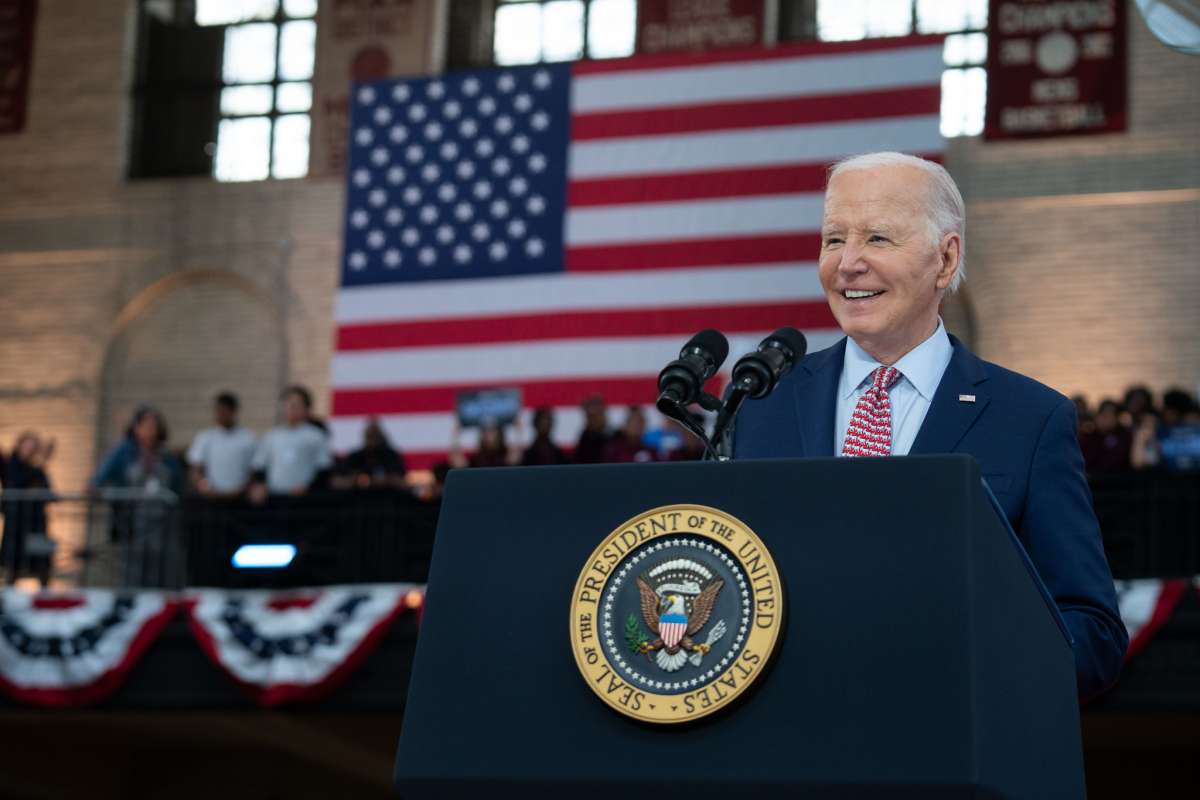The president hailed the goal as “ambitious,” though poorer nations quickly decried it as inadequate…reports Asian Lite News
President Joe Biden praised the COP29 deal Saturday as a “significant step” to fighting global warming, and pledged continued action by America despite his incoming successor Donald Trump’s climate skepticism.
“While there is still substantial work ahead of us to achieve our climate goals, today’s outcome puts us one significant step closer,” Biden said in a statement.
After two exhausting weeks of negotiations in Azerbaijan, the pact hammered out commits developed nations to pay at least $300 billion a year by 2035 to help developing countries green their economies and prepare for worse disasters.
Biden hailed the goal as “ambitious,” though poorer nations quickly decried it as inadequate.
The Baku meeting kicked off shortly after Trump won a new term in the White House, potentially setting the stage for him to undo actions by Biden’s administration.
Biden, who leaves office on January 20, said he was “confident” the United States “will continue this work: through our states and cities, our businesses, and our citizens, supported by durable legislation like the Inflation Reduction Act.”
“While some may seek to deny or delay the clean energy revolution that’s underway in America and around the world, nobody can reverse it — nobody.”
$300 billion deal insufficient, say advocates
Meanwhile, the voices of the most vulnerable were sidelined, human rights and civil society participation ignored, and accountability swept under the rug, say climate advocates on the conclusion of two-week UN climate change negotiations on Sunday with countries adopting a $300 billion a year global finance target to help poorer nations.
They say the package on mitigation, adaptation, and finance fails to deliver on the promises of the Paris Agreement and leaves the most vulnerable to pay the price for this inaction.
The UN Climate Change Conference (COP29) closed with a new finance goal to help countries to protect their people and economies against climate disasters, and share in the vast benefits of the clean energy boom.
With a central focus on climate finance, COP29 brought together nearly 200 countries in Baku, Azerbaijan, and reached a breakthrough agreement that will: Triple public finance to developing countries, from the previous goal of $100 billion annually, to $300 billion annually by 2035 and secure efforts of all actors to work together to scale up finance to developing countries, from public and private sources, to the amount of $1.3 trillion per year by 2035.
Responding to outcomes, a negotiator said, “2024, the hottest year on record, marks the moment at which rich countries like the US and Japan pulled purse strings tight on the poor and fossil fuel-driven economies like Saudi Arabia attempted to splinter the global coalition in support of climate action, leaving the world’s most vulnerable to find the compromises. But despite those headwinds and a chaotic process, a deal was done.”
Chiara Martinelli, Director at Climate Action Network (CAN) Europe, said the EU and rich countries have failed to deliver for the most vulnerable.
“Rich countries own the responsibility for the failed outcome at COP29. The talk of tripling from the $100 billion goal might sound impressive, but in reality, it falls far short, barely increasing from the previous commitment when adjusted for inflation and considering the bulk of this money will come in the form of unsustainable loans. This is not solidarity.”
UN Secretary-General Antonio Guterres said, “This was a complex negotiation in an uncertain and divided geopolitical landscape. I commend everyone who worked hard to build consensus. You have shown that multilateralism — centred on the Paris Agreement — can find a path through the most difficult issues.
“I appeal to governments to see this agreement as a foundation — and build on it.”
Indian expert Dipak Dasgupta, who is a Distinguished Fellow, TERI, said, “The $300 billion agreed, if absolutely firmly in the form of grant or highly concessional public money from developed countries as a group and not from loans from multilateral development banks or private sources, as was also agreed, is welcome. That would make a difference. Second, if the goal of $1.3 trillion remains firmly intact, again as agreed, and to be now spelled out concretely in the Baku to Belem roadmap, that is welcome, especially as it incorporates many other critical paragraphs spelled out explicitly in the agreement — from first loss to guarantees and other innovative financing, and to search for additional climate financing revenue instruments.”
Even as the deal was gavelled through, the Indian delegate, Adviser, Department of Economic Affairs, Chandni Raina, raised objections. “We wanted to make a statement prior to any decision on the adoption. However, this is for everyone to see this has been stage-managed and we are extremely disappointed with this incident.”
Aarti Khosla, Director, Climate Trends, said, “The decision to have a new climate finance goal that replaces the $100 billion per year has been marred with the difficulties of squeezing any money out of the developed world, which is under obligation to provide resources. The $300 billion from all sources by 2035 remains uncertain and unclear but the best possible in times of geopolitical tensions existing across the world.
ALSO READ: Pakistan’s first direct cargo ship docks in Bangladesh since 1971

